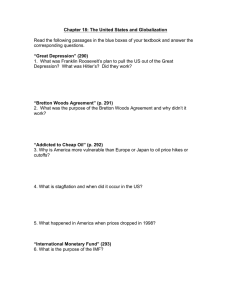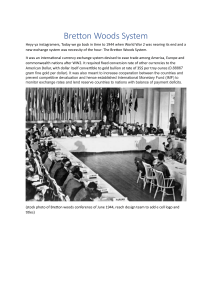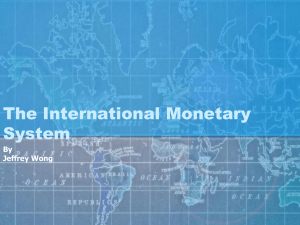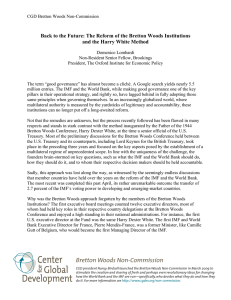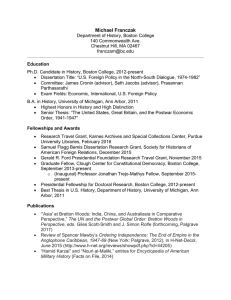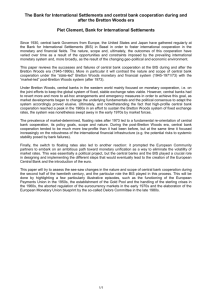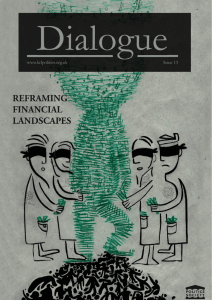Development Studies Definitions for Midterm
advertisement
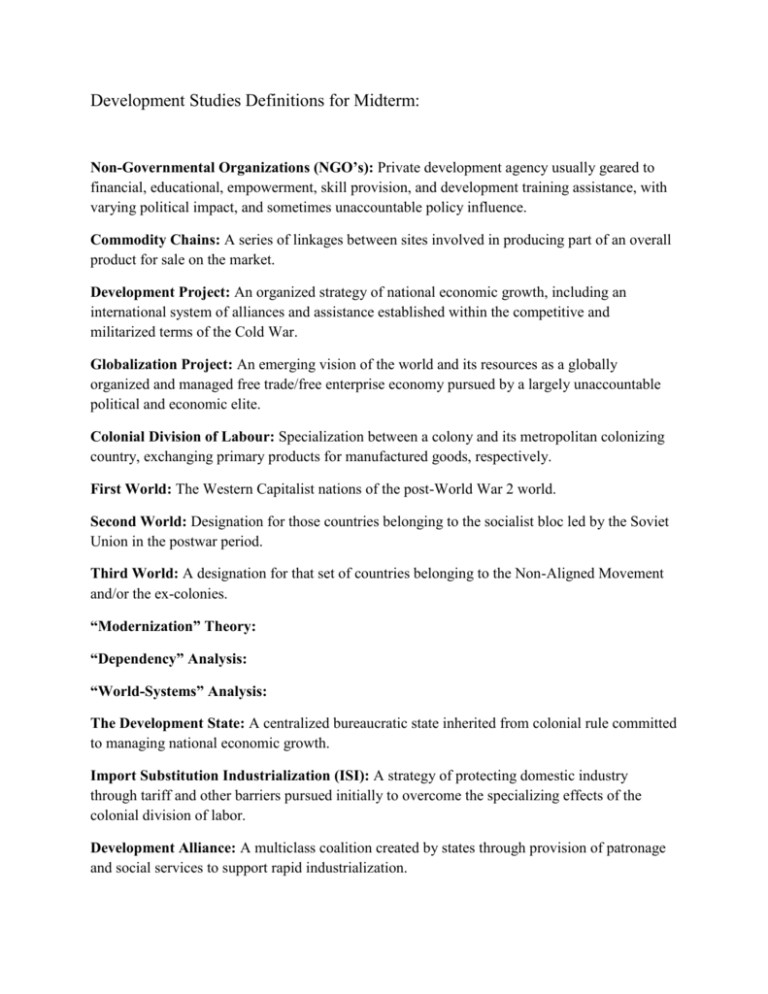
Development Studies Definitions for Midterm: Non-Governmental Organizations (NGO’s): Private development agency usually geared to financial, educational, empowerment, skill provision, and development training assistance, with varying political impact, and sometimes unaccountable policy influence. Commodity Chains: A series of linkages between sites involved in producing part of an overall product for sale on the market. Development Project: An organized strategy of national economic growth, including an international system of alliances and assistance established within the competitive and militarized terms of the Cold War. Globalization Project: An emerging vision of the world and its resources as a globally organized and managed free trade/free enterprise economy pursued by a largely unaccountable political and economic elite. Colonial Division of Labour: Specialization between a colony and its metropolitan colonizing country, exchanging primary products for manufactured goods, respectively. First World: The Western Capitalist nations of the post-World War 2 world. Second World: Designation for those countries belonging to the socialist bloc led by the Soviet Union in the postwar period. Third World: A designation for that set of countries belonging to the Non-Aligned Movement and/or the ex-colonies. “Modernization” Theory: “Dependency” Analysis: “World-Systems” Analysis: The Development State: A centralized bureaucratic state inherited from colonial rule committed to managing national economic growth. Import Substitution Industrialization (ISI): A strategy of protecting domestic industry through tariff and other barriers pursued initially to overcome the specializing effects of the colonial division of labor. Development Alliance: A multiclass coalition created by states through provision of patronage and social services to support rapid industrialization. Marshall Plan: A project of financial aid and exports credits organized by the United States to reconstruct postwar Europe and Japan. Bretton Woods program: The founding site of the international economic system established in 1944, to disperse long-term World Bank development project loans and short-term International monetary Fund monies to correct national imbalances of payments. World Bank: Official title is International Bank for Reconstruction and Development (IBRD) formed in 1944 to channel public funds into large development projects, including infrastructural and energy loans cash cropping, and more recently extractive reserve projects; key debt manager via structural adjustment and governance conditions. International Monetary Fund (IMF): Fund established under the Bretton Woods agreement of 1944 to correct balance of payments difficulties; more recently an agent of structural adjustment. Technology Transfer: The transfer of modern technologies to developing regions. Non-Aligned Movement (NAM): The General Agreement on Tariffs and Trade (GATT): United Nations Conference on Trade and Development (UNCTAD): Newly Industrializing Countries (NICs): Public Law 480 Program (PL-480): Green Revolution: Export-Oriented Industrialization (EOI): World Factory: The organization of TNC production across globally dispersed sites serviced by a global labor force. Maquiladoras: A production zone established on the U.S/Mexican border to assemble imported components with Mexican labour for export. Global Assembly Lines: Dispersal of production processes across sites of relatively low-skilled (feminized) labour predominantly in the global south. New International Division of Labour (NIDL): The growing specialization of some regions of the Third World in manufacturing for export. Lean Production: the rationalization of production arrangements, combining information technologies, craft work, and sweatshop labour, to supplement stable cores of workers with temporary labour outsourcing, to establish highly flexible arrangements for changing inventory needs. “World Farm”: Second Green Revolution: New Agricultural Countries (NACs): Those middle-income Third World countries pursuing agro-industrialization and agro-exporting. Flexible Production: Organization of production systems based on small and relatively unspecialized multi-tasking work forces allowing rapid response to changing market needs. Organization of Petroleum Exporting Countries (OPEC): A cartel of Third World oilproducing countries from the Middle East and North Africa as well as Indonesia Ecuador and Venezuela. New International Economic Order (NIEO): A failed initiative pursued by the G-77 countries in 1974 to reform the organization and management of the world economy along more equal and representative lines. Group of Seven (G-7): A solidarity grouping of Third World states formed in the mid-1960’s, overlapping with the NonAligned Movement, now numbering more than 120 states. Debt Regime: A set of rules established by the IMF and the World Bank as conditions to be implemented by indebted nations for further loans and debt rescheduling. Structural Adjustment Policies (SAP): the reallocation of economic resources by a state, typically under conditions laid down by the Bretton Woods institutions to pursue efficiency in the global economy by shrinking government expenditure, reducing wages, removing barriers to investment and trade, and devaluing the national currency. Privatization: Selling off public property such as national transport systems public, services and state-owned energy companies. Washington Consensus: A set of neo-liberal economic policies (trade and financial liberalization, privatization, and macro stability of the world economy) uniting multilateral institutions, representatives of the U.S state, and associated G-7 countries that enable corporate globalization. World Economic Forum: Organization representing political financial and corporate elites of the global North, meeting annually in Davos, Switzerland, to monitor and manage the global economy. World Social Forum: Diverse forum of NGO`s and global social justice movements that meets annually as counterpart to the World Economic Forum, usually in Porto Alegre, Brazil, to progressively realize the slogan: `another world is possible` Global Governance: Global Managers: A group of powerful bureaucrats and officials in the Bretton Woods institutions, and the WTO executives, in the transnational corporations and banks, and the bureaucratic elite, administering other FTA`s and global ecology. Comparative Advantage: A theorem about how countries specialize in producing and trading what they excel in, relatively, by virtue of their human and natural resources. Neoliberalism: A philosophy positing an individual instinct for economic self-interest, justifying elevation of market principles as the organizing principle of society, where private interest trumps the public good. Intellectual property rights: Rights to monopolize (in 20 year patents) inventions stemming from scientific discovery usually undertaken by corporate bodies. Biopiracy: A representation of the patenting of biological processes associated with the extraction and insertion of genes in existing organisms, obtaining a monopoly over the use of that genetic resource through genetic modification. NAFTA: North American Free Trade Agreement. Agreement signed in 1994 between Canada the United States and Mexico. European Union: Established in 1992, as a union of fifteen Western European states excluding Norway and Switzerland, the EU seeks to integrate their economies, promoting cooperation and policy coordination, with the Euro as common currency. Asian-Pacific Economic Cooperation: Conference founded in 1989 on the initiative of Australia; comprises of Australia, comprises the United States, Canada, Japan, South Korea, Australia, New Zealand, Mexico and the six ASEAN countries (Thailand, Malaysia, Indonesia, the Philippines, Hong Kong, Singapore.) Central American Free Trade Agreement: Heavily Indebted Poor Countries Initiative: Poverty Reduction Strategy Papers: Plans for economic and political restructuring prepared by states in partnership with the development agencies, as a way of extending a participatory principle to legitimize the practice of structural adjustment, which lost credibility in the 1990`s. Acronyms: AGRA AoA APEC BAIR BIP CAFTA CBD CEDAW CGIAR COMECON ECA ECLA EOI EPZ EU EurepGAP FAO FDI FLO FTA FTAA GAD GATS GATT GDI GDL GDP GEF GEM GNH GNP GPI HIPC HYV ICT IFI IMF IPR LDC MDG`s NAC NAFTA NAM NEPAD NGO NIC NIDL NIEO NTE OAU OECD PRSP SAL SAP SEZ TFN TIE TNB TNC TPN TRIMs TRIPs UNCED UNCTAD UNDP UNEP WEF WHO WID WSF WTO
